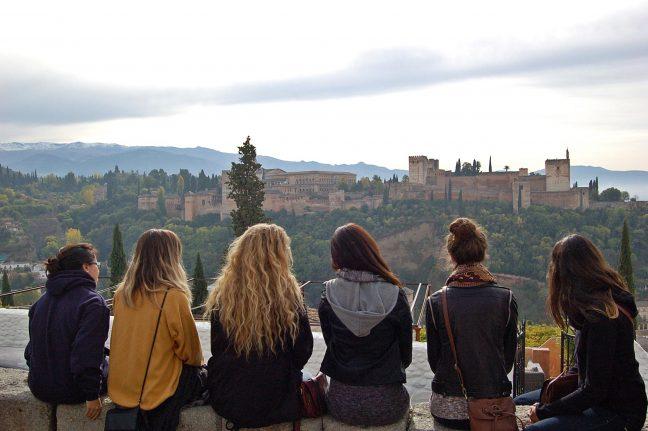I spent fall of 2016 studying abroad in Seville, Spain. From across the ocean, I watched as President Donald Trump was elected. I listened to Spaniards quote satirical “Simpsons” episodes, making fun of Americans. I weathered all the American stereotypes thrown at me. Now I’m back, and being an American feels different. Here are some of my observations.
I felt decently confident in my Spanish speaking abilities until I actually tried talking with a native speaker. Suddenly, I was tripping over my words, forgetting every conjugation and misusing vocabulary. My friend smiled encouragingly before unleashing a stream of sounds that hardly resembled a human utterance, let alone a language. The actual, real-life use of a language was significantly harder than my Spanish classrooms had prepared me for.
When I first arrived in Spain, I had to take a taxi from the airport with all my luggage. I told the taxi driver where to go and started blathering in English, nervously trying to fill the silence. He interrupted me, saying he didn’t speak English. It was the first time in my life I had encountered someone who couldn’t understand me, who I needed help from and to communicate with, who I had to use my limited language skills to try to talk to. It was terrifying. I stuttered over words I should know, silently questioning in my head what the word for 50 was so I could tell him my address. I felt nervous, stupid and all alone.
From 4,200 Miles Away: After a semester abroad, it’s not easy to feel proud to be an American
During my first day of classes, I sat by myself while groups of Spanish kids laughed and talked with one another before class. I didn’t understand anything they said. Their excited, fast speech moved too quickly for me to catch. I felt alienated.
When the professor started lecturing, I felt even worse. I could pick up on more of her speech, but I was always three seconds behind, processing her last sentence when she was already midway through the next one. It was overwhelming.
Classwork and assignments were just as challenging for me. A few weeks into the semester, I had to attend a talk then submit a paper detailing my opinions. In English, this would be an amazingly easy assignment. I would half listen to the talk and whip out an essay in 20 minutes. In Spanish, I couldn’t understand anything. I had absolutely no idea what the speaker was lecturing on, so I googled the professor, figured out what his research interests were, googled those topics and then spent three hours painstakingly crafting a response.
Many of my courses included a class participation grade, which meant I had to speak in my classes and talk in front of 40 students, knowing all of them would hear my thick accent and my grammatical errors. It was mortifying and terrifying.
From 4,200 Miles Away: Preparing for the inevitable fall of the American Empire
The Spaniards intimidated me with their pre-existing friend groups and their language fluency, so I shied away from them. After a while, I noticed other kids looking lost, and I found myself making friends with the other foreign students. In addition to speaking their native language and English, these people all spoke better Spanish than I did. The kids from northern Europe often spoke four or five languages with near fluency. Meanwhile, I was struggling with just English and Spanish.
I felt inadequate, as if my lack of language fluency equated with a lack of intelligence. I couldn’t express myself, I couldn’t effectively communicate and I felt inferior to those people who could.
Every day things had become scary for me. I was nervous to order coffee because I wasn’t entirely sure how to say “medium,” and I didn’t know any other drink order besides café con leche. I often didn’t understand store clerks when they told me my sales total or when they needed me to hand them my credit card. I just relied on hand gestures and facial expressions. I noticed myself going mute in public, not wanting to embarrass myself with subpar Spanish.
Eventually, I started to feel more comfortable with my Spanish, but those feelings of loneliness or inadequacy never really went away. I could tell people assumed I was stupider than I was because I couldn’t easily understand or express myself, or because I spoke with grammatical errors and an accent. I felt separated from the Spaniards because even when I could understand their words, I struggled with the connotations, sarcasm or colloquialisms. The language barrier affected my classwork, my friend group, my behavior and even my level of comfort in society.
Language fluency and the ability to communicate is something I take for granted. In a Spanish-speaking society, I came to appreciate and understand the frustration and isolation you feel when you can’t fully communicate.
In an increasingly globalized world, we should try to facilitate communication with as many people as we can. We should be studying second and third languages. But at the very least, we need to be cognizant of the challenges that non-native speakers face. We should understand slow speech and grammatical errors often belie true intelligence. We should appreciate accented speech because it represents diversity and not resent it because the speaker failed to adhere to the linguistic norm in the U.S.














